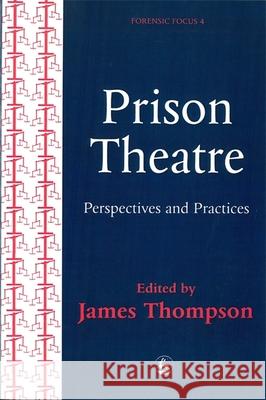Prison Theatre: Practices and Perspectives » książka
Prison Theatre: Practices and Perspectives
ISBN-13: 9781853024177 / Angielski / Miękka / 2000 / 240 str.
The 13 chapters in this books are serious, thoughtful and varied. The particular problems of prison work are spelled out meticulously. The essays are not only useful for prison work. There are very generous outlines of processes which could be stimulating for other groups. - New Life Prison Theatre describes the rich variety of programmes of theatre with offenders. This multi-disciplinary volume informs debates both in the criminal justice system and in discussion about the role and function of theatre. The contributors explore a wide range of topics within this diverse field, including: working with women prisoners and with people with learning difficulties dramatherapy with violent offenders prison theatre work in Brazil theatre work with young offenders dramatic intervention in probation services and with ex-offenders. This is a stimulating and thought-provoking book which will provide valuable reading for practitioners, professionals and students across the fields of the arts therapies, criminology and criminal justice, psychology and performing arts. This book has changed my life. Soon after I received it ... the University of Turin launched a scheme to begin offering courses in local prisons. They wanted someone to teach an English course. Stirred by the book, I showed interest - and was accepted ... The 13 chapters in the book are serious, thoughtful and varied. The particular problems of prison work are spelled out meticulously ... The essays in this book are not useful only for prison work. There are very generous outlines of processes which could be stimulating for other groups too ... I welcome the 'Forensic Focus' series. This, in particular, is a very stimulating and valuable book. Go easy with it. It may change your life.' - Dramatherapy Prison Theatre... offers a variety of perspectives on a range of practical and theoretical approaches to the use of drama and theatre in prisons and probation. Although mostly about the criminal justice system in Britain the work undertaken in Brazilian prisons gives examples of working practices and a positive commitment to work in the arts in prisons that could be studied further in this country. Particularly interesting and useful are the four chapters which deal with the therapeutic and rehabilitative aspects of using drama and theatre in secure settings including the use of creative processes to examine the roots of offending behaviour and in building prisoners' confidence, self-esteem and communication skills. The practices described in this book challenge the 'deeply reactionary notion that punishment has any significant determining effect on crime' (p. 40). The preface to each section, by an American who is now serving a life sentence without the chance of parole, and the chapter by Joe White (an ex-offender, now a playwright and director) offer ample evidence of the powerful and positive effect of this kind of work. An over-arching focus within the whole publication is the overlap between work in drama and theatre and the links between therapy, education and rehabilitation. It is clear that a hybrid form of practice is being developed in this particular context which is worthy of further indepth study.' - Speech & Drama











